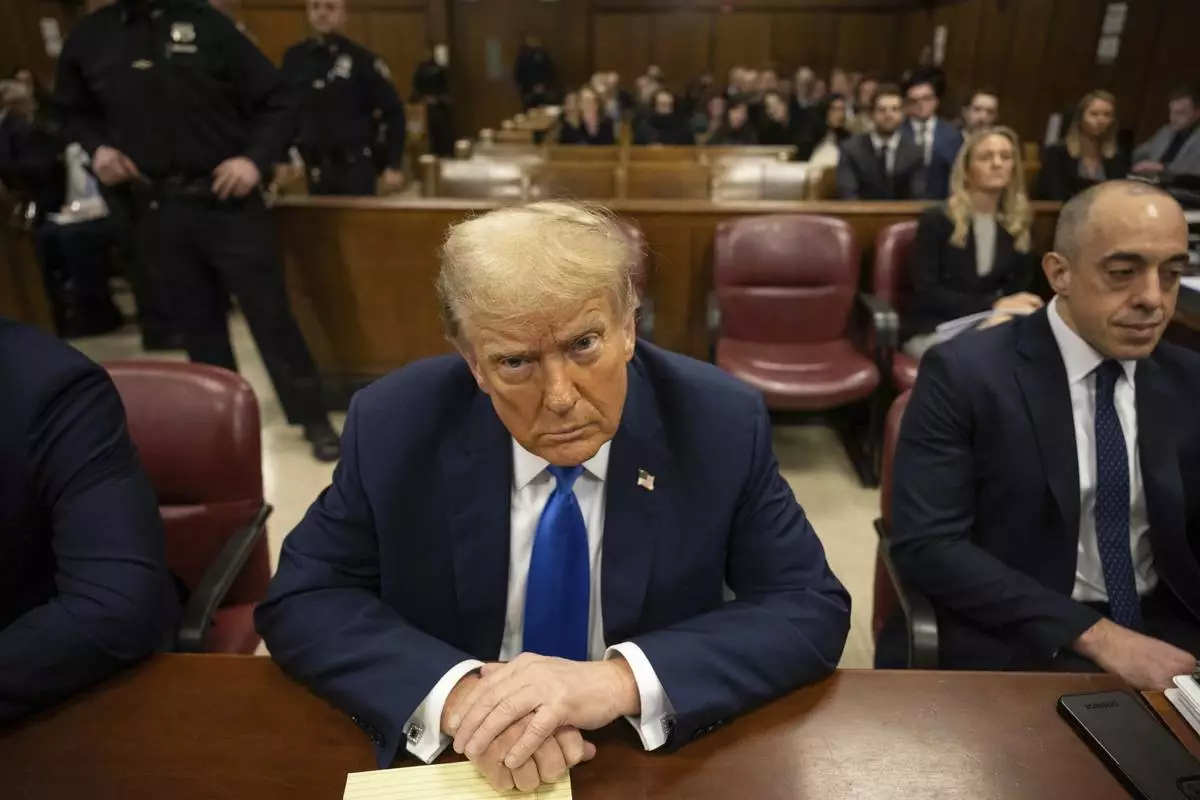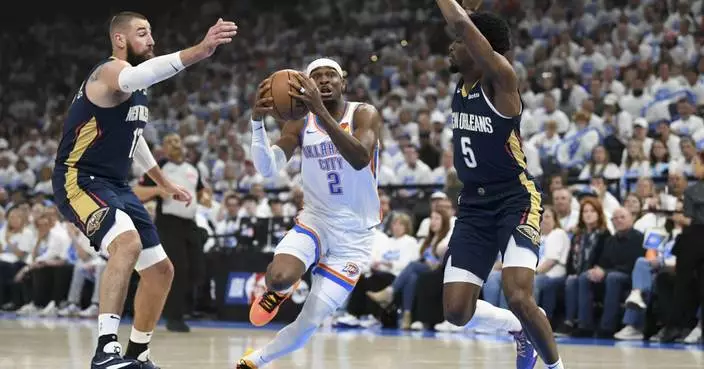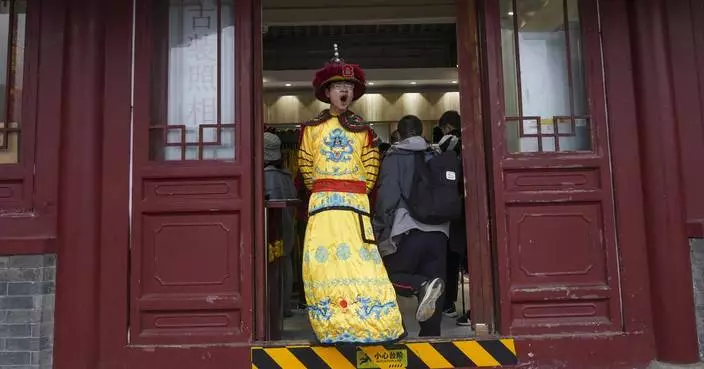Janel Firestone found her son — the 24-year-old, just resigned mayor of the Pennsylvania tiny town of Mount Carbon — in what she assumed was a deep sleep. She tried to wake him for his overnight shift at the local supermarket, but he couldn't be roused, even after she sprinkled him with water from a wet washcloth.
She wasn't concerned. Brandon Wentz had always been a heavy, heavy sleeper.
Recent days had been hard for him. The family had just moved to a nearby town, requiring him to give up his office, and he had agonized over his resignation letter. He felt like he was letting his constituents down.
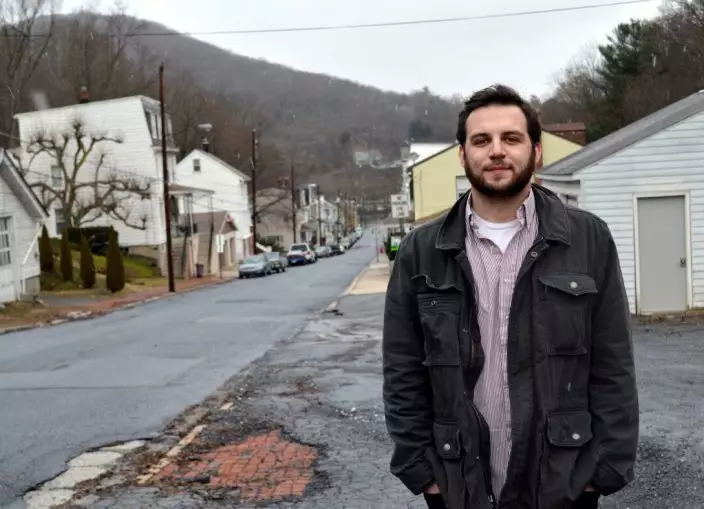
In this February 2016 photo provided by Michael Bunner, Brandon Wentz poses for a portrait in Mount Carbon, Pa., after he was appointed the town's mayor at age 22. Wentz's family is speaking out for the first time about his sudden death one year ago. Wentz was 22 when he became mayor of Mount Carbon, population 87. He died suddenly last November at age 24, just hours after resigning from office due to a family move. Wentz's family says he died of an overdose of heroin and fentanyl. His passing came near the end of a year that saw a record number of drug overdose deaths. (Michael Bunner via AP)
It was a small thing, that letter, but Wentz's inability to write it reflected his recent struggles.
"You could just see the stress and sadness in him," recalled his mother.
Wentz finally submitted a rather perfunctory 180 words and met up with a close friend, Ryan Fessler. They hung out in Wentz's room for a while, and Fessler left.
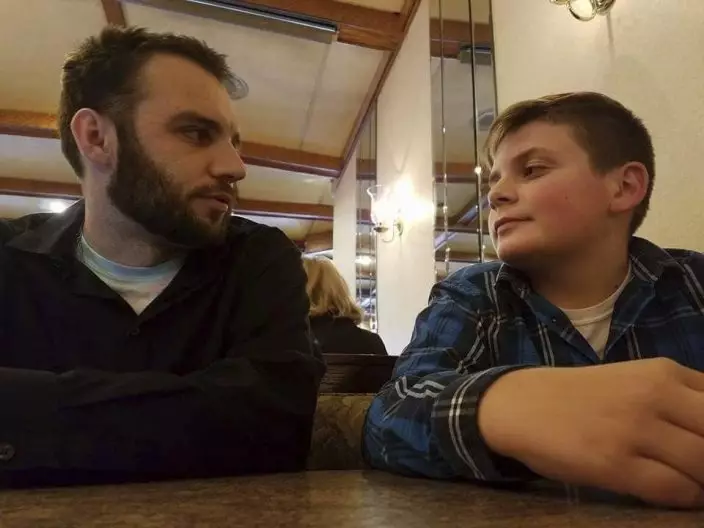
In this Oct. 4, 2017, photo provided by Janel Firestone, Brandon Wentz, left, and his younger brother Brent Firestone sit in a restaurant in Minersville, Pa. Wentz's family is speaking out for the first time about his sudden death one year ago. Wentz was 22 when he became mayor of Mount Carbon, population 87. He died suddenly last November at age 24, just hours after resigning from office due to a family move. Wentz's family says he died of an overdose of heroin and fentanyl. His passing came near the end of a year that saw a record number of drug overdose deaths. (Janel Firestone via AP)
A few hours later, Firestone tried to roust her son. She gave up, deciding to let him sleep off a migraine. What she did not know was that her son was not sleeping — he was dying of a fatal overdose of heroin and fentanyl.
By the time Firestone found him at 6:30 a.m. the next morning, foaming at the mouth, he was gone.
A police investigation was launched into Wentz's death, and state troopers sought to question Fessler. But they would never get the opportunity. Fessler, too, would die of an overdose less than six months later.
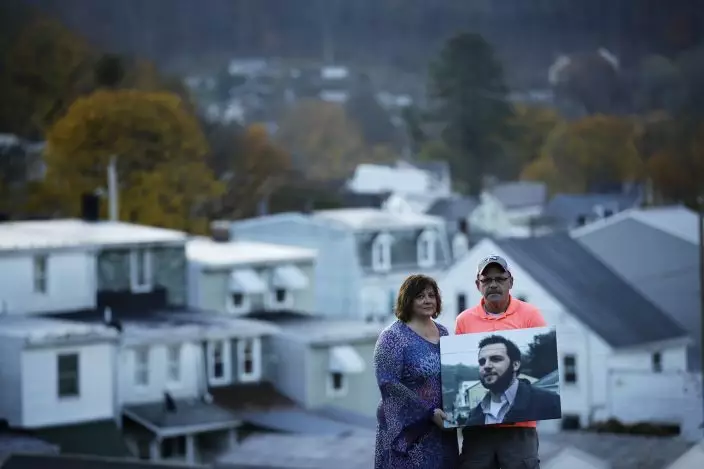
In this Nov. 8, 2018 photo, Janel Wentz and Tim Firestone pose for a photograph in Port Carbon, Pa. while holding an image of their late son former Mount Carbon Mayor Brandon Wentz. Wentz's family is speaking out for the first time about his sudden death one year ago. Wentz was 22 when he became mayor of Mount Carbon, population 87. He died suddenly last November at age 24, just hours after resigning from office due to a family move. Wentz's family says he died of an overdose of heroin and fentanyl. His passing came near the end of a year that saw a record number of drug overdose deaths. (AP PhotoMatt Rourke)
Two friends poisoned by the same deadly cocktail — two families, left to suffer and to question who and how and why.
Wentz's passing on Nov. 9, 2017, came near the end of a year that saw a record number of drug overdose deaths — more than 72,000 nationwide, according to the Centers for Disease Control and Prevention. Two weeks before Wentz died, President Donald Trump declared the opioid epidemic to be a "public health emergency."
By that time, fentanyl had emerged as one of the biggest threats. A synthetic opioid both cheap to produce and more powerful than heroin, it has flooded the illicit drug market in recent years. The drug was implicated in two-thirds of Pennsylvania's 5,456 overdose deaths in 2017, a 150 percent increase in just two years in one of the nation's hardest-hit states in the ongoing opioid epidemic.
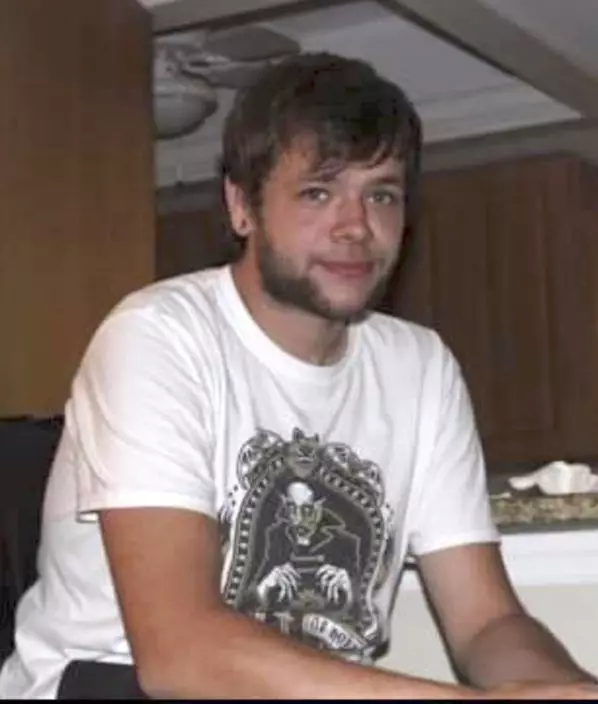
In this January 2018 photo provided by Kim Kramer, Ryan Fessler poses for a photo in Pottsville, Pa. Wentz's family is speaking out for the first time about his sudden death one year ago. Wentz was 22 when he became mayor of Mount Carbon, population 87. He died suddenly last November at age 24, just hours after resigning from office due to a family move. Wentz's family says he died of an overdose of heroin and fentanyl. His passing came near the end of a year that saw a record number of drug overdose deaths. (Kim Kramer via AP)
Wentz's family said they never saw it coming.
"I never would've thought he had an issue," said Firestone, speaking publicly about the circumstances of her son's death for the first time. "Brandon made a mistake and paid the ultimate price."
Wentz had a lot going for him. The young man known to all as "Honcho" was just 22 when he became mayor of Mount Carbon, population 87, a speck of a town in eastern Pennsylvania's coal region. Wentz, whose grandmother had served as Mount Carbon's first female mayor in the 1980s, relished the role and took it seriously, fielding constituent concerns and helping the volunteer fire department rebuild after its firehouse burned down.
"We greatly appreciated him. The compassion that he showed for us, I can't even explain it. It was overwhelming," said Mary Ann Sadusky, a fire department trustee.
Apart from his mayoral responsibilities, Wentz was a doting older brother, a professional writing major at Kutztown University, a hoops fan who covered the NBA for a sports website. Universally well-liked, he had a wide circle of friends and could make anyone laugh.
"He essentially was a mayor before he became The Mayor," said a longtime friend, Brandon Radziewicz, who credits Wentz with bringing him out of his shell in high school.
But Wentz had another side. His closest companions were aware he was dabbling in heroin, which they frowned on but felt powerless to do anything about. They didn't know how often he used drugs, and it was easy to tell themselves he had it under control , it wasn't that bad or he could make his own decisions. They talked about going to Wentz's family, but decided to let it go.
Once Ryan Fessler entered Wentz's life, his behavior became more difficult to ignore.
A couple years older than Wentz, Fessler was artistic and musical, quick-witted and sensitive. He worked a succession of low-wage jobs, but never seemed to have a grand plan for his life.
"He just wanted to do his music," said his mother, Kim Kramer.
Fessler's own struggle with drugs started with the prescription painkiller Percocet and then, when that became too expensive and difficult to obtain, shifted to heroin. He asked his mother for money but she refused, knowing where he'd spend it.
By the fall of 2017, Fessler was profoundly addicted — a "lost soul," according to Julie Sears, a friend from childhood who began dating him that summer.
Fessler and Wentz bonded over drugs, but their friendship went a lot deeper, according to Sears.
"They were the same person," she said. "They both wrote, they both drew, they would make up funny raps together. They really did want the best for each other."
Most of Wentz's longtime friends didn't see it that way. They were alarmed by his relationship with Fessler.
"He wasn't a bad person, he was nice, but he had his own demons, too, and demons will invite more demons," Radziewicz said. "I think they were good at fueling each other's habits."
Wentz's family had no idea he was using opioids, but they could see that his life had taken a turn.
A few months after becoming mayor, Wentz was pulled over by state police, who found a small bag of marijuana and a glass pipe in his Pontiac Grand Prix. Wentz pleaded guilty to DUI and was sentenced to 72 hours in jail. He also lost his driver's license, which forced Wentz, a commuter student, to take a leave from Kutztown.
It was his first and only brush with the law, aside from a couple traffic tickets, and it affected him deeply. He was upset his classmates were leaving him behind, and disappointed that he had let himself and his family down. He wrote a note from his jail cell, apologizing to his mother for what he had done.
Wentz had suffered anxiety and depression since high school, and now those symptoms grew worse. He began seeing a psychiatrist, but didn't think the medication was working.
Friends believed his heroin use became more frequent in the summer and fall of 2017.
Not long before his death, Wentz told Andrew Vogel, one of his English professors and a trusted adviser, that he might never make it back to school. Vogel had taken a special interest in Wentz, an unfocused but undeniably talented student, and pleaded with him to keep his options open.
"He was worried about how people were perceiving him when we spoke last, with the DUI, with resigning from his position as mayor, struggling with school, all of that," Vogel recalled. "He was concerned about what people thought. He wanted to do the right thing."
A few days later, Firestone came home from work to find her son sitting in the dark, suffering a migraine and putting the final touches on his resignation letter. Fessler showed up just as she was leaving for the grocery store.
Firestone wasn't exactly thrilled to see him. She had never trusted Fessler. It was just a gut feeling. She told her son she didn't like them hanging out.
"Mom, you've just got to give him a chance," Wentz would reply. "You don't really know him. He's just going through some issues. He just needs a friend."
Now, with his mother at the store, Wentz told his younger brother that he and Fessler "need to have an adult conversation."
They disappeared into Wentz's bedroom.
It was the morning after. Firestone's world had come crashing down, and here was Fessler, again, at her doorstep, not five minutes after her son's body was taken away.
Fessler was beside himself when he found out his good friend was dead — as distraught as his mother and girlfriend had ever seen him — and insisted on going to Wentz's house.
"What can I do?" he asked Firestone.
She showed him a business card. It had been left by a state police trooper who was at the house earlier.
"This officer needs you to call him," she said. "He has questions for you."
Fessler took a photo of the card and promised to "turn myself in." He asked Firestone for a hug; she couldn't do it. Not then, and maybe not ever. Even then, she suspected Fessler had given drugs to her son.
Fessler did not reach out to police. A trooper left a message on his cellphone in early December, but instead of returning the call, he blocked the number. A few weeks later, on Christmas Eve, his girlfriend found him in bed. He was high and he was crying.
"I killed my best friend," he wailed. "I gave it to him."
In his grief, Fessler's addiction grew worse.
Kramer begged her son to move to Florida to be with his father. He had no drug contacts there, and would have a shot at recovery.
Fessler agreed. He spent the early part of 2018 in the Sunshine State, in treatment. He was doing better.
But Fessler also faced unrelated drug charges in Pennsylvania, and he had to return for a hearing. His family worried he would relapse. They plotted to bring him back just long enough to go to court, to watch him closely and whisk him back to Florida as soon as it was over.
Firestone caught wind of Fessler's scheduled court appearance, alerting state police that he would be back in town. A trooper told her he would go to the hearing to ask him about Wentz's death.
But Fessler never made it.
Early on the morning of April 16, he fatally overdosed on heroin and fentanyl, the same combination that killed Wentz. He'd been in Pennsylvania just over two days.
Kramer, Firestone and their families had come to the same terrible place. Both lost children to the same poisons. Both wanted to know how it could have happened, and whom they could hold responsible.
To this day, Firestone is unsure about the extent of her son's drug use. His organs did not show signs of heavy or chronic use.
"My gut feeling is he contacted Ryan to get something to take the edge off that day," she said.
Whatever the reason, she's sure he didn't intend to overdose. A few hours before his death, Wentz had asked his mom to swing by their old house in Mount Carbon to pick up his flash drive — he told her he planned to set up a space in their new house and start writing again. Then he sent her a list of things to get from the grocery store: green grapes, pepperoni, apple sauce, crackers, iced tea, sports drink.
More than anything else, Firestone wishes his friends had brought their concerns about her son to her.
"We could have saved his life together rather than bury him together," she said.
His friend Radziewicz agrees.
"I was thinking, foolishly, that I would lose my best friend, and he wouldn't talk to me again," Radziewicz said. "Guess what? I lost my best friend."
Firestone cried anew when she learned of Fessler's death. She was sad for his mom, and frustrated that the truth about her own son's death might never come out. There were times when she couldn't help but hate Fessler, even as she understood that he struggled, too.
The families do not know each other. Firestone recently passed her number to Kramer, and Kramer plans to connect at some point. "She needs to talk to me, I think," Kramer said.
Kramer says she understands Firestone's feelings toward her son — because she feels the same about whoever supplied her own son's drugs.
"I'm there," Kramer said. "I get it, I truly do. You wake up, you think about it all day, it's forever there. You want to find out who gave it to them. ... You want to hate the one who handed your son the bag."



